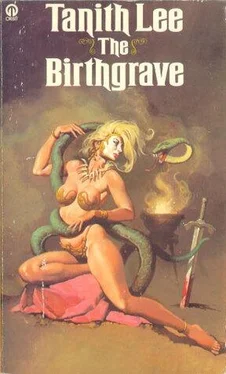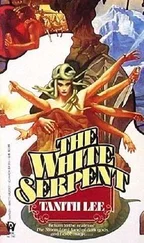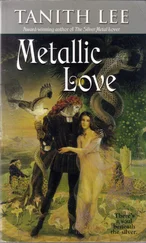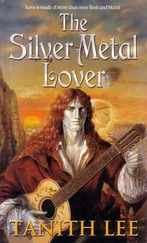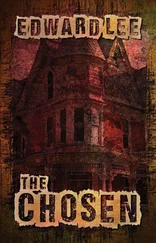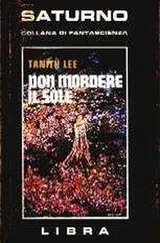Tanith Lee - The Birthgrave
Здесь есть возможность читать онлайн «Tanith Lee - The Birthgrave» весь текст электронной книги совершенно бесплатно (целиком полную версию без сокращений). В некоторых случаях можно слушать аудио, скачать через торрент в формате fb2 и присутствует краткое содержание. Год выпуска: 1977, ISBN: 1977, Издательство: Orbit, Жанр: Фэнтези, на английском языке. Описание произведения, (предисловие) а так же отзывы посетителей доступны на портале библиотеки ЛибКат.
- Название:The Birthgrave
- Автор:
- Издательство:Orbit
- Жанр:
- Год:1977
- ISBN:0-86007-942-2
- Рейтинг книги:3 / 5. Голосов: 1
-
Избранное:Добавить в избранное
- Отзывы:
-
Ваша оценка:
- 60
- 1
- 2
- 3
- 4
- 5
The Birthgrave: краткое содержание, описание и аннотация
Предлагаем к чтению аннотацию, описание, краткое содержание или предисловие (зависит от того, что написал сам автор книги «The Birthgrave»). Если вы не нашли необходимую информацию о книге — напишите в комментариях, мы постараемся отыскать её.
The Birthgrave — читать онлайн бесплатно полную книгу (весь текст) целиком
Ниже представлен текст книги, разбитый по страницам. Система сохранения места последней прочитанной страницы, позволяет с удобством читать онлайн бесплатно книгу «The Birthgrave», без необходимости каждый раз заново искать на чём Вы остановились. Поставьте закладку, и сможете в любой момент перейти на страницу, на которой закончили чтение.
Интервал:
Закладка:
I was tired, walking with my eyes half closed and my feet dragging. At the edge of the sea I left my footprints, the lace fans cold on my skin, smelling the ancient fish smell of the water. Sand gave way to pebble, and then again to altered, muddier sand. I threw my garland to the sea, and watched the waves carry it off, then bring it back to me.
It came to me, as I walked, how bitter the irony of the Book had been which had said: Herein the Truth.
For it had a truth of its own in its bleached barrenness. What was truth except something which faded, lost its shape, grew unreadable and indistinguishable, at last a blank page for men to write on what they wished.
All pebbles and chunks of the white stone now underfoot. The night was sliding down behind the land on ruffled wings, and the bitter cold of the sea-dawn fastened on me. Most of the night I had walked under the towering giant’s pottery of cliffs, while the tide drew in and out, breathing. Once I had climbed to a higher place, out of the water’s reach, and slept there until the new silence of the waves slipping away again woke me, and I went on. I was hemmed in between the long flat water and the high irregular stoneworks.
A marigold sun rose from the sea, seeming to drip back its color into the silver breakers. Seabirds wheeled and cried.
I rounded yet another cliff face, and found it was the last. Before me lay a wide and open sandy bay, scooped back to the terraces of low hills. Beyond the bay, far off, half painted on the morning mist, a tongue of land that poked out many miles into the water. At first I did not see the white shapes scattered across the hills of the bay and the tongue of land. But the sun pointed with a chilly orange finger, and I realized I had found my dream’s cities with the dawn.
I walked into the cold water of the bay, following the curve of it, yet not going any closer. A kind of extra sense, all that was left to me of my Power, told me that this place was very old, older than Ezlann, the Dark City, older even than Kee-ool, and not only ancient, but unlived-in, unvisited. Some atmospheric barrier surrounded it that kept men away The far-off ancestors of the black tribe had come once—and they had found the Book. Perhaps others had come—briefly, yet never staying long enough to leave any imprint on the cold stones. And whoever had come and gone, the cities had forgotten them.
I thought of those cities of Sea’s Edge in the far south, that last alliance Vazkor had planned to conquer.
Had they also fallen into decay? Would his armies, if they had come there, have met with another such ancient indifference?
A sound broke harsh behind me, making me spin, wide eyed, to see what demon-guardian the ruins had woken against me.
Three tall black men stood waiting in the surf, the wind lifting their long hair, spears in their right hands, knives at their narrow hips. Their leader, the tallest, spoke again:
“To men and women of our krarl comes the need, sometimes, to seek this place. All who feel such need come here. Was there such a need in you?”
“Yes,” I said, “and a need to be alone here, too.”
“Not good to be alone here,” the warrior said gently. “There are strange things in the cities by day, and stranger things, with the night.”
The cold wind nicked my skin. I shivered.
“I am Fethlin,” he said.
“I am Wexl,” “I, Peyuan,” the second and third men said.
Again the magic number of three had repeated itself—my guard, once more, stood waiting to serve me, having followed me through the night—and I had not even sensed their presence. But this time I did not want this security. No more men should die for me like fools.
“Go back,” I said. “Go back to Qwenex and your people. I profaned your trance-circle on the beach. I opened the golden Book—I broke the hearth-bond and the guest-promise of your krarl. Spit on me, and go back.”
Fethlin looked at me, and he said, “That was your need.”
“You know nothing of my need,” I shouted at him. “Go back—go away—I will have no more butchered lives strung around my neck!”
I stopped shouting, and the wind filled the silence, as it had filled all the silences in this bay for thousands of years.
“If you enter the city, we will follow you,” Fethlin said. “That is how it must be. Your need is our need.
Only our own gods understand why.”
There seemed something completely final in that they had recognized, as Maggur and his would not, as Mazlek and his only partly would, that they were bound to me by some motiveless and insane unnatural law.
“Very well, then,” I said. “None of us has a choice. I am sorry, for you will die.”
I turned my back, and began to walk inland toward the curved scoop of the bay, ignoring that they came after me.
3
Farther south, a causeway led from the sea, rising clear of the beach. Perhaps there had been a harbor there, and a watch beacon; nothing remained. Beyond the sand a grassy slope, tangled with tough dark green trees, and, climbing up between these, I found the first ruin of a road, once forty, fifty feet across, set with those great slabs I remembered from the Lforn Kl Javhovor; there was not much left of it now.
Paving had been heaved aside by growing things. Lichens and weeds wove together like a tapestry, a pall to cover something dead.
Then there was a green open stretch where the road lost itself entirely and reappeared twenty feet away, dividing a broken wall, flanked on either side by the bases of pillars. They had been very tall once, now they seemed like the melted-down stubs of candles. When I reached them, I put out my hands to touch the blurred carving. Nothing stirred inside me or around me. Yet this had been a phoenix gate, long ago.
When I went through it, and stood inside the city, I had to glance back quickly. Behind the figures of the warriors I saw the sea’s pale glitter still moving in the bay. I turned, and went on over the green and white patchwork paving, between the open foundations which were all that remained. A few cracked marble obelisks leaned toward the hills, as if undecided whether to fall now or to wait a few centuries longer.
The strange howling winds which live in deserted places blew through the wreckage of palace walls.
The sun rose higher, and the sky was a brittle uncertain blue. It was noon, and I had passed through many gates, across many ruined roads. They had become one and the same to me. We were higher into the terraced hills, the sea behind us, remotely turquoise. Here, between buildings, a tree had thrust itself. I sat down beneath it, staring out across the empty plaza.
Fethlin, Wexl and Peyuan crouched a few feet from me, shared a small meal of goat cheese and dried dates. I refused the food they offered, but took a sip or two from the waterskin Fethlin carried.
The ruins made me ill at ease, I needed to move on, despite my tiredness, yet I did not know where to go, nor what I must look for. Though the wind still blew hard, it was warmer. I shut my eyes, leaning against the tree. I was dozing, slipping into sleep, when suddenly the green spear opened my brain. I started awake, and in that moment, felt the Pull, strong as I had felt it on the plain before Ezlann. I got to my feet and stood still, trying it, as a dog sniffs out a faintly remembered scent.
There was a little side street, flanked by a few solitary standing walls, leading southward out of the plaza.
I walked toward it, and into it, and down it, and heard the sounds of Fethlin and the other two, rising and coming after me. In a while, the Pull became so strong I began to run. One of my black shadows ran beside me, three others behind me. The street vanished in among trees. And beyond their dark moist shade, the land fell abruptly away and downward. I stopped, finding I was looking out across a small valley, hidden by the terraced hills from the beach, and the cliffs.
Читать дальшеИнтервал:
Закладка:
Похожие книги на «The Birthgrave»
Представляем Вашему вниманию похожие книги на «The Birthgrave» списком для выбора. Мы отобрали схожую по названию и смыслу литературу в надежде предоставить читателям больше вариантов отыскать новые, интересные, ещё непрочитанные произведения.
Обсуждение, отзывы о книге «The Birthgrave» и просто собственные мнения читателей. Оставьте ваши комментарии, напишите, что Вы думаете о произведении, его смысле или главных героях. Укажите что конкретно понравилось, а что нет, и почему Вы так считаете.
